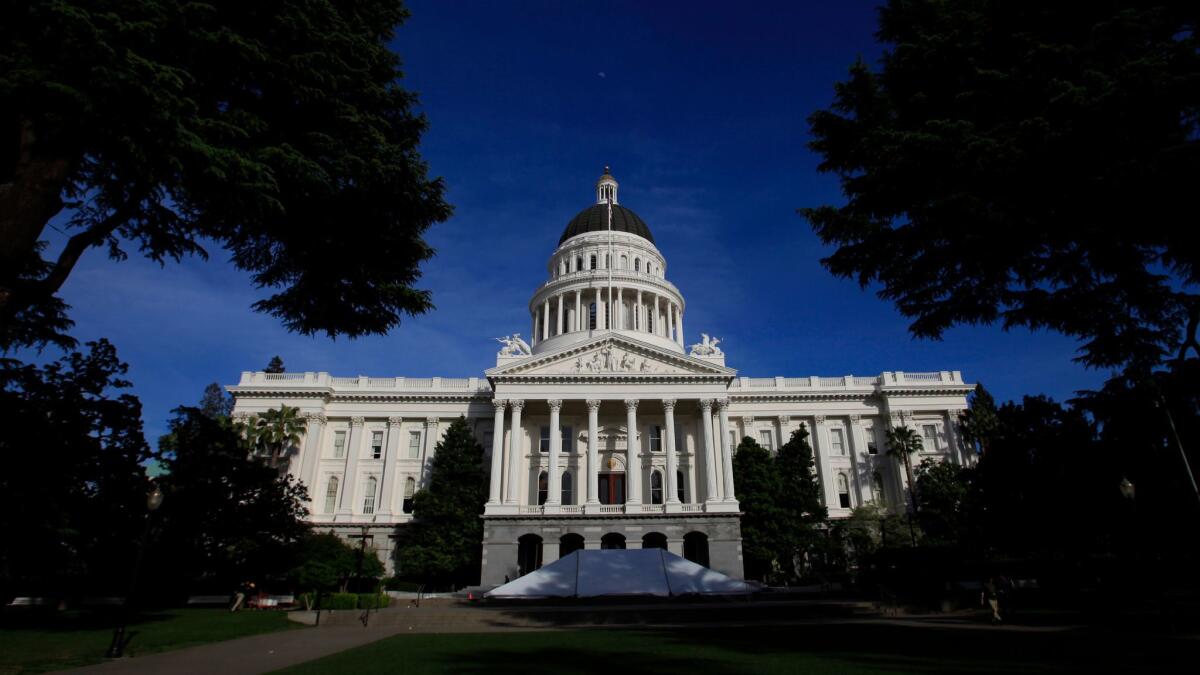Column: There’s no firm rule for punishing a California lawmaker’s bad behavior

- Share via
Reporting from Sacramento — The California Legislature has a 49-page set of rules that govern all kinds of activity under the state Capitol dome: when to introduce bills, whether to cover the expenses of committee staff members, the power to draw the boundaries of fish and wildlife districts.
What you won’t find is an explanation of the behavior that can get a member of the Assembly or Senate reprimanded or, even worse, kicked out.
Last Thursday, for one of the only times in California history, a formal expulsion was mere moments away from being debated in open session. The legislator in question, state Sen. Tony Mendoza (D-Artesia), quickly resigned before the resolution could be brought to the floor.
On Tuesday of this week, it will be exactly 113 years since the Legislature’s last expulsions — four senators who were removed for accepting bribes of $350 each. Newspaper reports from the era show the scandal played out quickly, with less than a month between the time the money was offered and the vote taken that ousted them from office.
So what standard was used in 1905 to mete out the punishment? It’s hard to say, but it certainly seems different than the one used in 2014, when two senators accused of corruption and a third of voter fraud were punished with the lesser discipline of suspension.
“The satisfying thing would be to expel them immediately,” then-Senate leader Darrell Steinberg told his colleagues during a floor speech. “But I reluctantly conclude that what would be satisfying and popular would also run afoul of the most basic American principle of due process and the idea that people are presumed innocent unless and until proven guilty.”
California’s Legislature has disclosure rules that apply to no other part of government »
The fear seems to be that a different standard, maybe one more akin to “you know it when you see it,” can lead to accusations that partisan politics have crept in. Might those in power banish one of their own to quash a PR crisis, or come down hard on a member of the other party in hopes of winning that seat on election day? These aren’t theoretical questions in this era where one party routinely controls a supermajority of seats in both houses — the same number of votes it takes to oust a lawmaker.
And it’s not just expulsion that has no firm rules. The same is true for censure of a lawmaker or suspension — the latter, until voters stepped in to amend the California Constitution, once came with a guaranteed paycheck. The ambiguity of what triggers these serious sanctions is at the heart of a lawsuit Mendoza filed against the Senate almost two weeks ago in which he insists that his leave of absence was “unconstitutional.”
In short, lawmakers generally have taken the position that it’s voters who decide whether someone should hold elected office. California’s electorate can use whatever standard it chooses to make those decisions. Even the infrequently used power of recalling an elected official is allowed for subjective reasons — from an Assembly Republican removed in 1995 for helping Democrats stay in power to former Gov. Gray Davis’ 2003 recall for “failing in general to deal with the state’s major problems.”
The acute conversation about sexual harassment may be changing the reluctance of lawmakers to impose discipline. As the Legislature considers new internal workplace rules — from defining “zero tolerance” of harassment and abuse to how complaints are investigated and judged — it may want to also consider a clear standard for imposing the ultimate punishment on politicians.
Everyone agrees that actions in the legislative workplace should have consequences. The question is whether that includes the kind of consequences written about in history books.
Follow @johnmyers on Twitter, sign up for our daily Essential Politics newsletter and listen to the weekly California Politics Podcast
ALSO:
Updates on California politics
More to Read
Get the L.A. Times Politics newsletter
Deeply reported insights into legislation, politics and policy from Sacramento, Washington and beyond. In your inbox twice per week.
You may occasionally receive promotional content from the Los Angeles Times.











